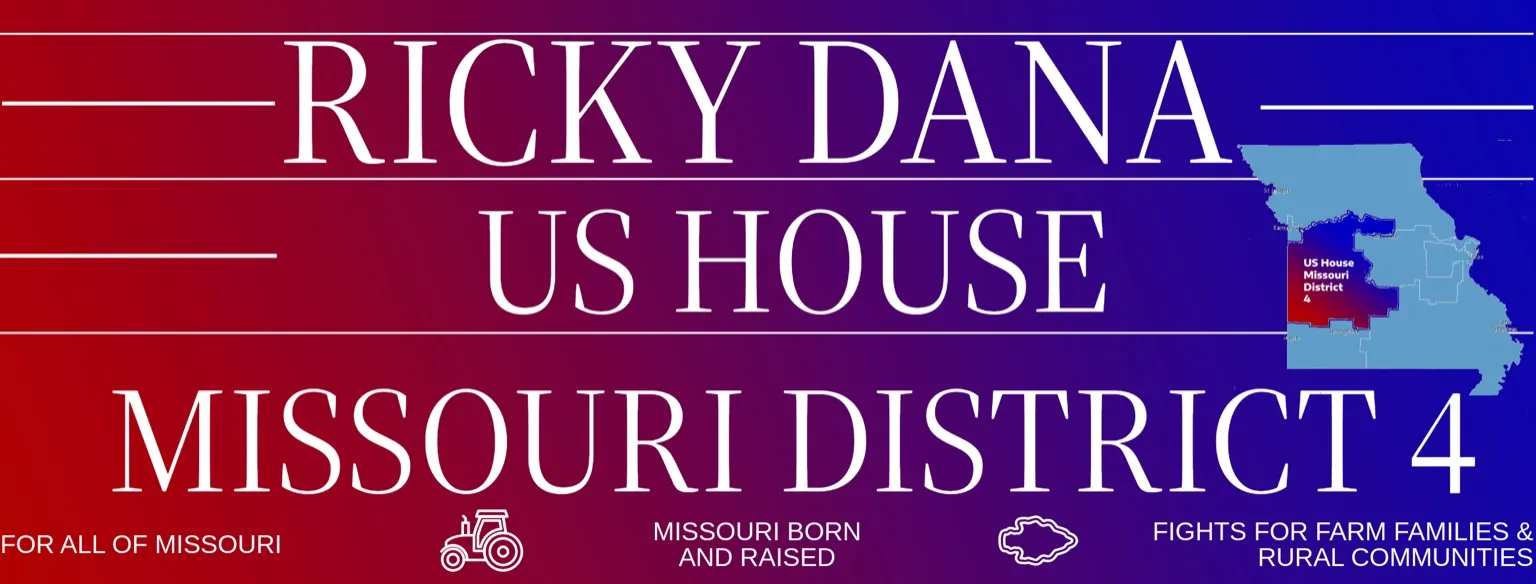Summary
Graves’s new “Rails to Trails Landowner Rights Act”—co-signed by Mark “Awful” Alford—would hand any one landowner a veto and dump new costs on local taxpayers. Current law already protects property rights with compensation, so this bill solves nothing.

By Ricky Dana, Candidate for US House, Missouri-4
Graves’s “Rails to Trails” bill: a solution in search of a problem
On August 11, 2025, KTTN reported that Rep. Sam Graves introduced the “Rails to Trails Landowner Rights Act,” pitched as protection against federal “seizures.” Missouri Representatives Ann Wagner and Mark “Awful” Alford signed on, along with Bob Onder and others. Here’s the problem: the premise is wrong, and the fix makes things worse for rural communities like ours.
What the bill actually does
The bill rewrites the federal rails-to-trails program to require signed approval from each affected landowner within 30 days. It also forces any trail sponsor—often a small town or nonprofit—to promise fair-market-value payments for impacts and to take on perpetual maintenance. On top of that, it adds a new 90-day federal comment process and a mandated cost-benefit study that the local sponsor must pay for before anything moves. In plain English: one neighbor can veto the entire project, and counties get handed the bill.
What current law already guarantees
Under the National Trails System Act, unused rail corridors can be “railbanked” for interim trail use so the corridor isn’t lost forever. The U.S. Supreme Court has already upheld this framework as constitutional and made clear that if a taking occurs, landowners have a direct path to just compensation through the U.S. Court of Federal Claims. That’s been the law for decades. Federal courts have repeatedly recognized that when the Surface Transportation Board issues a Notice of Interim Trail Use (NITU), a compensable taking often occurs—and the remedy is payment, not shutting down the corridor.
So the real question isn’t whether landowners get paid—they do. It’s whether Washington should give any single person a veto that blocks everyone else’s use, stalls corridor preservation, and forces local taxpayers to shoulder new costs that federal law doesn’t require today.
Why Graves’s approach hurts rural Missouri
First, a “one-neighbor veto” means miles of rail corridor can be wasted because one signature is missing. That’s not how we get public works done. We don’t build roads, water lines, or power lines by unanimous consent of every parcel along the route. We follow a lawful process and pay fair compensation.
Second, the bill shifts costs from the federal government to small towns, counties, and volunteer groups. Requiring pre-arranged, fair-market payments and perpetual maintenance guarantees will scare off community sponsors and bury rural budgets in legal paperwork.
Third, it undermines corridor preservation. Railbanked rights-of-way aren’t just for walkers and cyclists. They keep a continuous corridor intact for future rail service and can host utilities and broadband later. Once a corridor is chopped up, it’s gone—for trains, for emergency access, for fiber, for the next generation.
About that “federal seizure” claim
Calling railbanking a federal “seizure” is political spin. The Supreme Court has already said the program stands on firm constitutional ground, and when property rights are burdened, the remedy is just compensation. That balance—public use with payment when required—is exactly how America has built infrastructure for a century.
Who pushed it
Missouri’s Mark “Awful” Alford jumped to co-sponsor, with Ann Wagner and Bob Onder joining the list. That tells you who this bill serves: not the everyday taxpaying landowner who already has compensation rights, but a political agenda that makes projects impossible and hands local governments unfunded mandates.
My commitment
When I’m elected as your congressman, I’ll defend both property rights and local taxpayers. I’ll keep the current compensation pathway intact, cut the red tape that chokes small towns, and protect rail corridors so our communities can use them—for rail, trails, utilities, and broadband—without a one-neighbor veto.
Sources:
KTTN: Graves introduces bill to protect landowners from federal seizures (Aug. 11, 2025)
Congress.gov: H.R. 9604 (118th) – Rails to Trails Landowner Rights Act (bill text)
Congress.gov: H.R. 9604 overview and status
Preseault v. ICC, 494 U.S. 1 (1990) – Supreme Court (constitutionality; compensation via Tucker Act)
Federal Register: STB rule on Trails Act procedures (49 C.F.R. § 1152.29)
U.S. Court of Federal Claims (2023): NITU can cause a taking requiring compensation



Leave a Reply